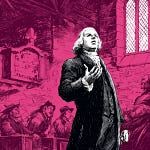Question 45: What was the role of the Holy Spirit in God’s redemptive revelation in the days of the Old Covenant?
Answer: The redemptive revelation of God, being his saving revelation of himself, was enabled and empowered by the Holy Spirit, in the days of the Old Covenant, firstly through the ministry of the prophets, but also through various acts, words, appearances, and symbols of divine revelation.
What’s the difference between the work of the Holy Spirit in the Old Testament, and the work of the Holy Spirit in the New Testament? It’s one of those questions that, when we occasionally give our attention to it, raises a host of other questions, and these are questions that believers typically either don’t think about, or simply don’t know. What, then, is the difference? And why does the answer to that question matter?
We can’t fully answer that question in this article, of course. But we are going to begin thinking about one question touching on this issue, that being: What’s the nature of the Holy Spirit’s work of redemptive revelation in the Old Covenant?
As we’ve seen time and time again, Christ’s incarnation – Christ himself – is the centrepiece of God’s redemptive revelation to man. But the incarnation of our Lord, in and of itself, was not the only thing that God did, or had done, to reveal himself. As we saw in Question 16, God revealed himself formerly through various acts, words, appearances, and symbols.1 God’s redemptive work of revealing Christ has spanned the entirety of human history – both Old and New Covenants.
Before we explore in more detail the Spirit’s work of revelation today, it’s worth our time to take a look back and consider the Spirit’s prior work of redemptive revelation under the Old Covenant. As you may remember from our previous studies under Question 16, redemptive revelation has come to us in four ‘modes’ throughout history: i) act; ii) word; iii) theophany; and iv) symbol. We saw also that all four modes of redemptive revelation are fulfilled in and culminate in Jesus Christ.
We’ve already explored the role of the Holy Spirit in natural revelation (see Question 42 and Question 43). As we saw, creation itself is an act of revelation (Ps 19:1), and all other modes of revelation come to us in that context. How all encompassing is the presence of the Holy Spirit in every way! He is not far from any one of us. How wonderful and comforting to know of his ceaseless and omnipresent work in the creation and in his redemptive work! After the fall, what was the nature of the Holy Spirit’s work of redemptive revelation?
Since the days of Abraham, Isaac, and Jacob (i.e. the patriarchal period2), as in all the days of the Old Covenant, we can be certain that the Holy Spirit was the prophetic agent at work in all God’s prophets. The Apostle Peter makes this clear: “For no prophecy was ever produced by the will of man, but men spoke from God as they were carried along by the Holy Spirit” (2 Peter 1:21). The very account of the Patriarchs, written through the pen of Moses, was inspired by the Holy Spirit. So too in the mouths of men like David, the Holy Spirit spoke (Acts 1:16). Psalm 2, for example, is a composition of the Holy Spirit! (Acts 4:25). At every point, the Spirit was the universal agent of redemptive revelation, and he especially focused that revelation in the ministry of the Old Testament prophets.
The works of the Holy Spirit are well testified in the Old Testament. By the skill imparted to men in Israel, the symbolic revelation of the sacrificial system, and the Tabernacle, was accomplished in the Old Covenant (Ex 31:3). By the Spirit’s indwelling empowerment, Joshua became a type of Christ, a foreshadow of Christ’s victorious leadership over his people (Deut 34:9). As the Spirit empowered Christ in his messianic office, so he empowered the men, the Kings of Israel, who temporarily occupied that office under the Old Covenant (1 Sam 11:6; 16:13-14). The Holy Spirit revealed himself in theophany as the divine presence among God’s people Israel. At the crossing of the Red Sea, for example, Isaiah testifies that the Holy Spirit was put in the midst of them (Is 63:10). The Spirit filled prophets like Ezekiel with his Holy Word (Ez 2:2), again, all in preparation for the revelation of Christ (Luke 24:27). By David’s mouth the Spirit testified of the betrayal of Judas (Acts 1:16).
The majesty of God’s redemptive revelation in the person of his Son, the Lord Jesus Christ, was richly attested, and abundantly prepared under the Old Covenant. Indeed, even under the New Covenant, the books of the Old still form the majority of the word that God has given us.
Perhaps at this point you’re thinking: this is good orthodoxy, these are things I agree with, but – if you’re honest – it’s not terribly captivating. To the extent that my writing has been boring and contributed to this, I must apologise. But good theology, of course, needs to lead with orthopraxy to accompany the orthodoxy. That is to say, we need to see why this matters. Let me close these thoughts out addressing that question. Two thoughts here.
Firstly, because the Holy Spirit was at work to reveal Christ under the Old Covenant, we can be absolutely confident that the Old Testament is not irrelevant to us. We can be certain that, by the Spirit’s help, we will see Christ gloriously in the pages of the Old Testament from our New Covenantal vantage point. Your Old Testament might seem hard to read at points, but always read expecting to see wonderful visions of Christ’s glory. Churches that neglect the Old Testament are doing themselves great harm, and are neglecting a mighty provision that God has made for us to understand him on a deeper level. By all means, love and delight in the New Testament. But became a master of the Old. The New Testament itself, of course, makes use of the Old Testament frequently (in fact, a good portion of the New Testament is quotations of the Old). Do not neglect to study your Old Testament!
Secondly, and here I think is a point of application especially relevant to Reformed-type churches, consider the Old Testament as an opportunity to move into a deeper level of personal intimacy with the Holy Spirit. I shudder when I hear Reformed believers refer to the Holy Spirit as an “it.” And yet how tragically common it is. The Holy Spirit, the third person of the Trinity, is no “it.” He is one of the three persons of the godhead! And yet, because of his humble role in the workings of the godhead, and because of his constant labours to exalt the Father through the revelation of the Son, we may, perhaps, have less of a sense of his personality than we do of the Father and of the Son. As a point of application then, consider your Old Testament reading (and your New Testament reading, for that matter), to be an opportunity to commune with the Holy Spirit in the quiet times of life.
For example, as you see the Father enthroned sovereignly above the nations in Psalm 2, and you glory in the enthronement of the Son at his right hand, and you see the Father and the Son majestically exalted, take a moment to consider also that the Psalm was composed by the Spirit. You are not only being drawn in, under the Spirit’s influence, to worship of the Father, through the Son in this Psalm. But you are drawing in to the intimacy of the Spirit’s thoughts and affections. If a loved one wrote you a poem, you might be moved with affection as you read it, with a sense of nearness as their heart is unfurled in those words. So too the Spirit reveals his Christ-exalting heart to us in the Word. Hear him, in Psalm 2, as he adores the Son, and exalts in the sovereign majesty of the Father. We might consider any portion of the divinely inspired word of God, and ask the same question: what does this passage reveal to us of the heart of the Holy Spirit? Treasure your Old Testament, and keep in step with the Spirit as you read. SDG.
1Question 16: What is God’s redemptive revelation?
Answer: The redemptive revelation of God is his saving revelation of himself, formerly through various acts, words, appearances, and symbols, and finally and ultimately culminating in the incarnate word himself: Jesus Christ.
2 The patriarchal period is the period of time when the “Patriarchs” of the Jewish nation were alive (e.g. Abraham, Isaac, Jacob…). It’s narrated in the book of Genesis, chapters 12 through 50. You would say that it ended with the death of Jacob at the end of Genesis. Scripture recognizes the unique place of the Patriarchs by frequently referring to God as “the God of Abraham, Isaac, and Jacob.” They are the foundation of the Jewish nation, the men to whom God gave the great and mighty promises of redemption that would be realized through Israel.













Share this post